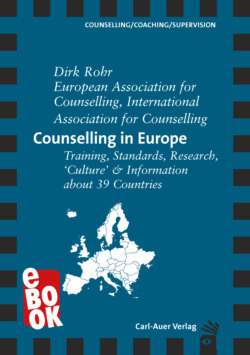Читать книгу Counselling in Europe - Dirk Rohr - Страница 5
На сайте Литреса книга снята с продажи.
Introduction
ОглавлениеFirst of all I would like to point out that I am not a native speaker thus my English is by no means perfect. Nonetheless, I hope you will gain much information from this book and with it increase your knowledge and understanding about counselling.
I thank David Dutch (EAC) and Renate Luther for helping with the translation and Sofiia Molot for the editing process.
I am writing this book from various roles that I currently hold, and I would like to link the enumeration directly with heartfelt thanks to the many colleagues from the various institutions:
My team in the "Counselling Research Unit" at the University of Cologne, Germany include Annette Hummelsheim, Marc Höcker, Robert Baum, Clara Stein, and Bianca Rusch. I would especially like to thank Sofiia Molot, who played the most prominent part in bringing the book together, formatting it, etc.
Within that unit I lead the research group for "World Mapping: Europe" with Vivien Magyar, Leonie Ziehm, Nina Reiter, Nina Bergemann, Chiara Epifani, Sarah Krütt and Agnes Ottinger.
I head the "Centre for Advanced Teaching and Learning (ZHD)" at the University of Cologne, too. Together with Hendrik den Ouden and Miriam Gertzen I have developed expertise in Adult Education and Higher Education Didactics.
In addition to working at the university I am also director of the koelner-institut.de which offers non-university teaching of counselling. My special thanks there go to Christine Jablonski, Martina Masurek, Franziska Gnest, Jonas Lichtenberg, Robert Baum and last but not least the co-director, my wife, Kathrin Meiners.
In April 2019, I became President of the 'European Association for Counselling (EAC)'. I especially thank Eva Metallidi (Vice President), Ivana Paunovic (General Secretary), Carolina Welin (Treasurer), David and Brenda Dutch (Webmaster and Administrative Assistant) for their support and guidance.
In May 2019, I became a member of the Executive Council of the 'International Association for Counselling (IAC)'. From the Board of IAC, I especially thank Bill Borgen (President) and Naoise Kelly (CEO) for their contribution to Chapter 3, and Dione Mifsud (past president IAC) for our diverse cooperation (e. g. the University of Cologne and University of Malta).
I thank Carl-Auer Verlag publishing who have been responsible for bringing this book to life. My gratitude to Matthias Ohler, Ralf Holtzmann, Nora Wilmsmann, Sandra Lode, Klaus Müller and Beate Ulrich. I have been associated with them since January 2018 as series editor of the petrol-coloured series "Counselling, Coaching, Supervision."
From January 2020, I became a member of the International Advisory Board "Counselling and Psychotherapy Research Journal – Linking research with practice (CPR)". I thank CPR for their permission to reproduce excerpts from my publications. I thank Natalia Zapolsky for the collaboration – without her, chapter six would not exist. Concerning Chapter eight, Research in counselling, I thank my mentor Charles Deutsch, Harvard University, the Marte Meo Research Group, especially my wife Kathrin Meiners, also Sophia Nettersheim. The Genogram Research Group, Clara Stein, Mario Winter, Sven Kullack, and Ellen Aschermann and Kristin Spath. The Research Group "Counselling – European and German Qualifications Framework (EQF/DQR) for Lifelong Learning" Marc Weinhardt, Cornelia Maier-Gutheil, Tim Stanik, Marc Höcker.
The ninth chapter is a guest contribution from John McLeod. Thank you very much, John.
Chapter 10 deals with some essential ethical topics – e. g. transcultural. It is a short form of a book I am writing together with Ilja Gold and Eva Weinberg (Gold, Weinberg and Rohr 2021), including Interviews with Souzan AlSabah, Sandra Karangwa, Berivan Moğultay-Tokuş, Amma Yeboah and a preface from Eia Asen. I thank all of them.
Chapter 1, 7, 8 and 10 are partly already published in German. I think some of the thoughts are very interesting for an international audience. I thank the publisher and my co-authors for allowing this.
Book structure
The first chapter defines and explains counselling. Then, in chapter 2, the European Association for Counselling (EAC) and its training standards are presented. Chapter three describes the International Association for Counselling (IAC). Chapter four gives an overview about the brief history and background of counselling, the current regulatory status, the challenges and trends as well as additional information of 39 European countries. These are the European results of the World Mapping Project (IAC). Chapter 5 gives an overview of the selected European-wide associations. The American and the European Standards are compared in chapter 6, while Chapter 7 deals with teaching counselling.
I cover the importance of research in chapter 8. The following Chapter 9 features a guest contribution from Prof. John McLeod, "Integrating research knowledge and awareness into counselling and psychotherapy training: an apprenticeship model". Finally, Chapter 10 deals with power, discrimination and racism in counselling.
